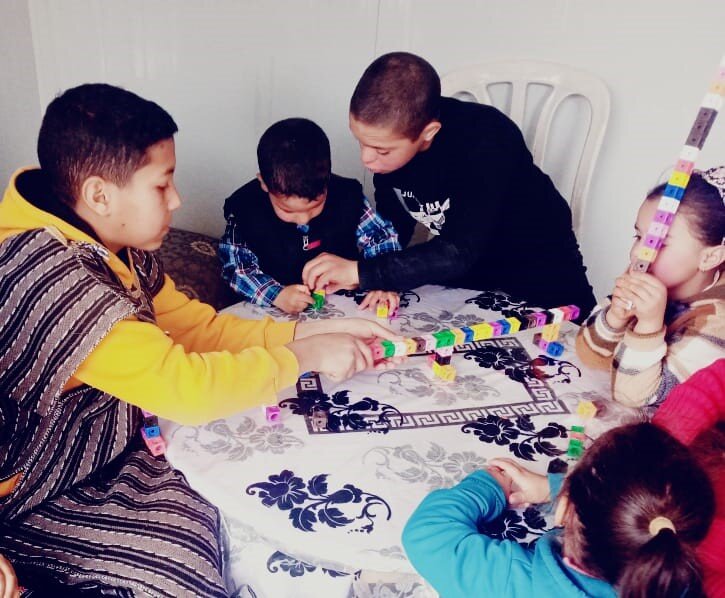By Nouhaila ELfatimi | HAF program assistant
This phrase at the beginning of our story alludes to a journey full of challenges and new experiences. It suggests to the reader what the story will revolve around. What will we talk about?
The starting point begins in the town of Imin T’ala, where we visited as a team for psychological and social support. This village’s infrastructure was completely destroyed by the Al Haouz earthquake.
The scene makes us think about the past, present, and future of the town and its residents and opens a door to exploring human emotions and experiences in light of tragedy and destruction.
The HAF team intends to ease the process of psychological and social reconstruction for the affected townspeople. The discussion will be about the impact of natural disasters on mental health and how psychological and social support can help overcome difficulties, building hope and renewal.
There is no life without pain and hope. These emotions are part of a symphony that makes life. Every town has its own story.
The earthquake is not the only reason for pain and hope in the villages. It is possible that there were other circumstances and hidden challenges behind what they experienced recently. Every town has an exceptional story.
As a team with different tasks, some of us work with the women of the town, but my job is to run workshops for the children.
When I received them into their room designated for various enjoyable workshops to overcome the psychological pain they experienced when they were so young, I asked a child his name.
His mother, who answered me, said his name is Ayoub, he cannot speak, and he is approximately fifteen years old.
So I said to her, “Okay, leave him here so that the children can participate in the workshop.” She replied with hope, “I do not want to hear any words that will bother me from the mothers of the other children.
My son never goes out and does not play with anyone. He is a bit violent.” My answer was rest assured, everything will be fine.
I had an idea in advance about him, how I would care for him, and the immense responsibility I had. Relating with children with Down Syndrome who exhibit violent behavior requires a deep understanding of their needs and a sensitive and balanced response.
It is first necessary to remember that violent behavior may be a way to express their needs or their inability to communicate effectively.
We must adopt an attitude of patience and understanding and try to direct the child towards positive alternative behavior. This is the approach that I took throughout the four days. I integrated it with the children, despite the difficulty of some situations.
It is natural that it is something new and different for Ayoub because he had not had much contact with other children. He played and participated in creative activities.
His presence was very special. He was just as compassionate despite his sudden mood swings and as smart despite his difficulty in understanding. He would arrange the figures with each other in the same color and shape with great precision. He worked with high concentration, despite the impaired vision he suffers from.
He does not know how to cheat. This group of children is usually characterized by honesty and integrity. Despite everything that Ayoub endures, he was trying to make some movements in order to bring joy to the lives of the other children, which made them feel happy and like they belonged with him.
When the children saw his positive interaction and his many attempts to communicate and participate, communication between them and Ayoub increased, which enhanced the feeling of acceptance in the group. This positive interaction strengthens social relationships, helps build self-confidence, and enhances the feeling of solidarity.
Although he was not able to speak, or in more correct terms, he did not receive the necessary care to develop his speech, he would repeat some of the words that the children say or that I said, such as “toy,” “you are beautiful,” and “good.” These are all motivational words that decorate the hearts of children.
During the workshops, I was working hard to change the stereotypical idea that the village children had about him. He is not an “idiot.”
He is a child who did not find the environment and care necessary for him and many children with Down syndrome, because awareness and acceptance of such cases in such areas are seemingly nonexistent.
Although there are no centers to receive and support children with such differences, it is necessary to educate these communities in order to increase the level of acceptance and support in society.
From my experience, I have found that including these children in daily activities and providing a supportive environment can have a profound impact, improving their quality of life and enhancing their abilities.
In addition, awareness and education in communities about Down syndrome and other differences are extremely important to promote understanding and acceptance.
Project reports on GlobalGiving are posted directly to globalgiving.org by Project Leaders as they are completed, generally every 3-4 months. To protect the integrity of these documents, GlobalGiving does not alter them; therefore you may find some language or formatting issues.
If you donate to this project or have donated to this project, you can receive an email when this project posts a report. You can also subscribe for reports without donating.
Support this important cause by creating a personalized fundraising page.
Start a Fundraiser